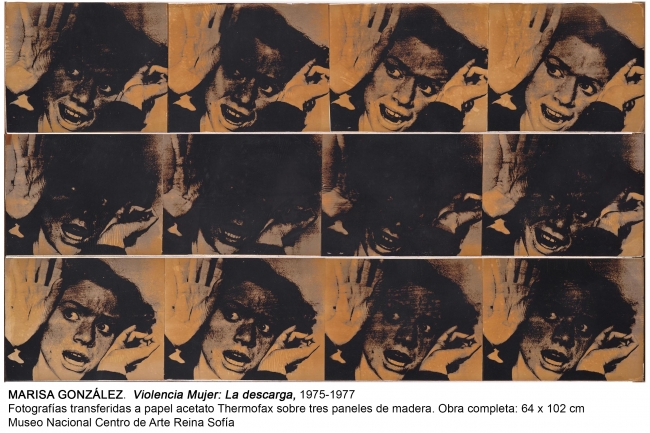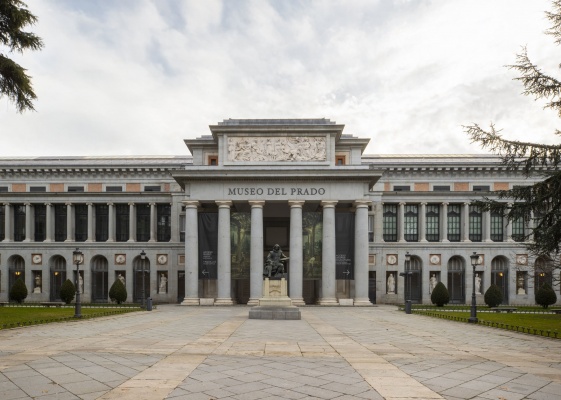Descripción de la Exposición 'History is a whore'. The stinging statement of the Argentinean writer Tomás Eloy Martínez that circulates in different versions in the language of Latin America and the United States is a perfect perspective to see (Re) Evolution Comics. This crucial exhibition in the career of Ivonne Ferrer (Havana, 1968), as scathing as light - in the bad sense of the term when it refers to the female genre - supposes a daring journey: to tell the history of Cuba from the Colony up to date through scenes that make use of the Cuban graphic tradition and dare 'to rape' certain chapters of diverse centuries approached with total pictorial freedom to unleash this 'potential of the obscene' revealed by Georges Bataille, and to create versions of history parallel to the official narrations. The way she uses a great number of graphical sources refers us to the metaphor of the thousand eyes of the fly - capable of landing without making a big fuss in the most sordid zones of reality - that Eloy Martínez himself considered as the only possibility to take a look at the multiple forms of complicity between history and power. But hervisual account not only has the levity of the smile and the indiscreet enchantment of the libidinous, but that license that gives a time without utopias to make fun of a history of the (r)evolutions in other places of a global world that, at this time, expects more from the artistic fictions than from the political fictions. In fact, these 24 works of comic art feed on the prolific Cuban graphic universe of several centuries that Ivonne plunders, in the best sense, with the freedom of an indecency that allows her to mix it promiscuously, if needed,with European erotic illustrations. Thus, she uses the resource of the popular smile to subvert the homogeneous vision of power and to reflect that 'second' look - that 'second world', as Mikjail Bakhtin called it, that emerges from the carnival. This exhibition feeds on the formidable reserves of this smile. It could be subtitled: How to screw history, in the most prosaic sense of the verb, since the smile entrenches itself in the same spaces where the excesses of eroticism are released and there it echoes louder than ever. The virtues stressed by Bakhtin in Rabelais may be attributed to these pieces: their proximity to the popular sources, and a character so far from the official that 'there is no dogmatism, authority or unilateral formality' that may harmonize with her way to subject the dominant stories to a ludic and lubricious treatment. The artist takes over 'the smile of the Medusa' and freezes in her images an account that demystifies the official forms of power and history, and that is only ruled by the carnival laws, challenging the archive starting from the joyful understanding of the relativity of the prevailing truths that she subjects to the force of Eros. Spaces of power in the island, as the building where the Palace of the Captains General was located in the colonial period in Cuba, were at the same time residence of the highest authority imposed by the Crown, resting place for sailors, brothel and prison, but this type of libidinous chapters were hidden. Ivonne re-updates the Foucault of The history of sexuality to discover from smile and sex alternate truths connected not only to the Cuban identity, but to this end of the story time where lies keep going: '...It is up to us to extract the truth of sex, since this truth is beyond its grasp; it is up to sex to tell us our truth, since sex is what hold it in darkness'. That's why the artist brings to her contemporary practice the use of the erotic impulse to activate the relation between thepopular smile and history: excesses, after all, have often encouraged an inversion of the official order. This mode of burlesque genre transplanted to the demystifying review of history in art supposes a clear consciousness of the fictions constituting history, not only in relation to the Cuban chaos - the last place where the imaginary of utopia settled - but to the whole world. Jacques Ranciere holds that there have been a mutation of the critical thought into duel thought after the end of the political utopias: this exhibition seems to contradict it, and suggests in exchange that smile thought that dates back to medieval burlesque tradition, but that may be connected in terms of plunder and of the re-appropriation of sources with the influence of the pop art: for six years, Ivonne Ferrer revised chapters of the history of her country, plundering old illustrations and engravings that include cigar labels, advertisements of products - as the 'Does everything' soap that puts double sense to a daring image of the slavery period - or newspapers of that time and vignettes of folkloric figures, such as the The pioneer girl, the Charade Chinese, or the Tropicana dancer, or posters that had in their moment the burden of the propaganda that falls apart here with laugh. Paintings as The last crisis I had with you not only supposes a promiscuity of means - collage of digitalized graphics printed on canvas and painted - but of references including paraphrased titles of popular songs, an event of world repercussion, newspapers of that period, and the representation of Cuba as a voluptuous woman surrounded by bullets of clear phallic connotations. The dinosaurs of a suspense and science fiction film as Jurassic Park are used to suggest a map of Miami and Havana as a contiguous territory for which these creatures, identical in both places, fight over. Each scene uses mockery and/or sex tounmask realities with the same temerity with which the people ridiculed thepowerful in the medieval carnivals. The distancing from the rigid history that allows the perspective of amusement - more propitious when the own island is seen from the distance - creates the necessary space for the laugh to echo. The way back to Cuba, through this comic art, is full of imaginative freedom. Thus, the exhibition includes - in a close relationship with the postmodern meta-artistic creation - not only a graphic parody full of crossed over appropriations, but forged found objects that are really a fabricated entertainment, and the ludic use of apocryphal documents and procedures in connivance with 'real' historical sources. The orgy appearing in the piece devoted to Yarini, the pimp that became a political figure in Havana, is a representation of how promiscuous the history of the country has been since the conquest. It is also a sharp allusion to how the revolutions of the XX century screwed history (in all the popular senses of the word) all over the world. If usually in post-modernity the appropriations do not have in general a critical intention, in (R)Evolution Comics the parody picks up a theatrical sense that is definitelyburlesque. Likewise, the procedure of pop affiliation in its relation to the treatment of graphics found, responds to an end - to a 'telos' - completely different from this movement: to make a stark scrutiny, to dismantle or remove history's clothes, and to undress it in such a way that its tricks are revealed. It's very compound official version is transformed into diversions in the style of pieces that are cultural artifacts, memorabilia of a post-historical time that, asArthur G. Danto says, has allowed art to be radically open. If the main topic of the Uneasiness of culture according to Sigmund Freud was blame, Ivonne Ferrer has got rid of it to lead, with no sign of shame, a smiling historical liberation.

Exposición. 21 may de 2025 - 22 sep de 2025 / Museo Nacional Centro de Arte Reina Sofía (MNCARS) / Madrid, España

Formación. 30 oct de 2025 - 11 jun de 2026 / Museo Nacional del Prado / Madrid, España